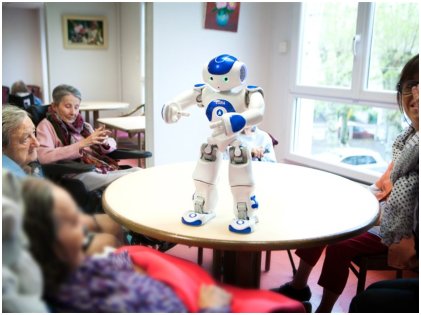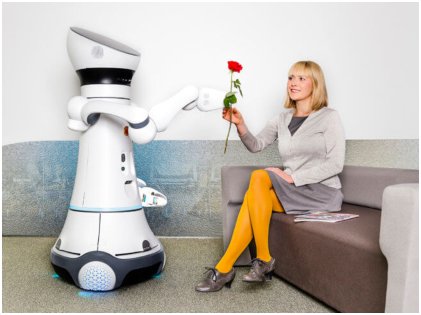While it may look more like a toy than a futuristic humanoid, Zora is a robot caregiver which might very well change the future of elderly care. The robot attendant arrived at a care home just outside Paris only a few days ago, and strange things already started happening. Many of the patients started developing an emotional attachment and treated Zora similar to how one would treat a baby. Zora, a robot caregiver, which can set you back $18,000, offers accompaniment to the elderly at a nursing facility in France. While all of this is part of an experiment, this could potentially be the future of elderly caregiving.
How Does Zora Work?
Patients at this French hospital, Hospital Jouarre, suffer from dementia and other age-related complications that need continuous care, as well as a little bit of love and compassion too. The nursing staff at this facility control Zora from a laptop. It’s the nurses who type words into their laptop for Zora to speak. The robot caregiver often leads the workout sessions and even plays various games with the residents. While there’s still a long way to go before we see an actual humanoid nurse in action, robot caregivers like Zora have the potential to become the face of elderly care in the future.
It doesn’t, however, dispense medicines, measure blood pressure and routine checkups that requires the assistance of a trained nurse. For some, it’s just a superfluous tool that keeps the residents busy. While nurses at the facility are still apprehensive about delegating intimate moments such as feeding patients, to Zora, the experience at the care home provides some direction towards what the future may hold. Zora Bots, the Belgium-based company that has made Zora, claims that they have sold more than a thousand of these robots to healthcare facilities around the world.
Can Robots Give Care To The Elderly?
 Assigning robots with the responsibility to take care of people who are in their dotage might seem a utopian prospect, but many researchers see it as inevitable. The global population of elderly adults is rising steadily and the number of people of 60 years or older would be more than 4.2 billion by 2050, as per a recent United Nations report. The emerging gap between caregivers and those who need it point toward a possible scarcity of aspirants for healthcare jobs. Enthusiastic persons of the emerging technologies argue for deploying robot caregivers at nursing facilities, at least in some capacity.
Assigning robots with the responsibility to take care of people who are in their dotage might seem a utopian prospect, but many researchers see it as inevitable. The global population of elderly adults is rising steadily and the number of people of 60 years or older would be more than 4.2 billion by 2050, as per a recent United Nations report. The emerging gap between caregivers and those who need it point toward a possible scarcity of aspirants for healthcare jobs. Enthusiastic persons of the emerging technologies argue for deploying robot caregivers at nursing facilities, at least in some capacity.
Robotic Companions: Can They Really Fit The Bill?
 Robotic companions have been romanticized in many ways in popular culture in recent years. If you can stream the Lost In Space reboot on Netflix, you will be able to understand and get a fair idea of this concept. The line between fantasy and everyday reality has started to become blurred. Robots are no longer figments of human imagination. Take for instance, the case of Zora. Barring a few sci-fi authors and Hollywood blockbuster scriptwriters and directors, who would have even imagined some twenty years ago that robots would be deployed at nursing facilities to take care of parents?
Robotic companions have been romanticized in many ways in popular culture in recent years. If you can stream the Lost In Space reboot on Netflix, you will be able to understand and get a fair idea of this concept. The line between fantasy and everyday reality has started to become blurred. Robots are no longer figments of human imagination. Take for instance, the case of Zora. Barring a few sci-fi authors and Hollywood blockbuster scriptwriters and directors, who would have even imagined some twenty years ago that robots would be deployed at nursing facilities to take care of parents?
The knee-high robot at this French care home does not only speak, sing, teach and play various games with the residents, but it also encourages and leads physical activities. However, if we talk about human touch and warmth, the likes of Zora won’t be able to really match up to their human counterparts for obvious reasons. Possibly, a few years down the line, we can see more advanced forms of robot caregivers that can wish patients a good morning, make them a nice breakfast, and even deliver pain-relievers.
The Future Will Be Dominated By Artificial Intelligence
 All this may sound like a pie in the sky, but given the recent advancements in Artificial Intelligence and Robotics, this may very well become a reality in the days to come. Robots have already been used in psychotherapy and family counseling. However, there are some practical questions that need answers, especially when it comes to deploying some disruptive technology for assisting and taking care of you in your most vulnerable years. For instance, can the droid caregiver give you an insulin shot? What will happen if you just refuse to take medicines?
All this may sound like a pie in the sky, but given the recent advancements in Artificial Intelligence and Robotics, this may very well become a reality in the days to come. Robots have already been used in psychotherapy and family counseling. However, there are some practical questions that need answers, especially when it comes to deploying some disruptive technology for assisting and taking care of you in your most vulnerable years. For instance, can the droid caregiver give you an insulin shot? What will happen if you just refuse to take medicines?
These are some questions that the innovators need to answer in the future. The biggest question is, however, would you be fine with a robot taking care of you?





